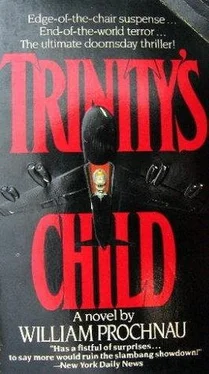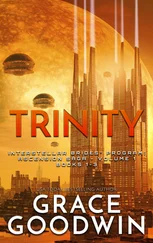The successor missed the pause, and the puzzlement. “So only the Chinese helped us,” he said.
“The Chinese didn’t help us,” Harpoon replied more curtly then he intended. He could feel his caution dissolving, his time compressing. “They tried to help themselves, as did everyone else. Anything that makes the Soviets feel more threatened now should be cause for alarm, not satisfaction, inside this aircraft.”
The successor stiffened. “Harpoon,” he said in bewilderment, “sometimes when you open your mouth I feel like it isn’t connected to my ears. Would you like to say that a different way?”
“No, sir. We are quite pressed for time.” The successor looked at him curiously, but Harpoon had decided to bull onward. It was time to lay it on the line. He beckoned to a three-star general sitting at the briefing table.
“The general is expert in nuclear effects and their meaning to civilian populations, political structure, social structure, et cetera. Would you speak as briefly as possible to that subject, general?”
The general rose reluctantly. “Let’s try to deal quickly with the rest of the world,” he began. “The world has survived plague, pestilence, famine, earthquakes, floods, wars, disasters of immense proportion—”
Harpoon frowned. “General,” he interrupted, “keep it short. Please.”
“Sorry, admiral, but it is important to understand the context. In the 1920’s an earthquake killed two hundred thousand people in Tokyo and Yokohama—approximately the number killed in the World War Two atom-bomb attacks on Hiroshima and Nagasaki twenty years later. We have forgotten the earthquake.” He let the words sit very briefly. “My point is simply that the world has absorbed such punishment, natural and manmade, in the past. So when we look at the world map, forgetting the superpowers, we see an incredible amount of damage, grief, and suffering. As it stands now, all of it would be absorbed, even with the radiation effects.”
Harpoon shifted impatiently from one foot to the other. “Okay, general, the superpowers?”
“Well, you look at those maps…” The general let out a large whoosh of air. “You look at those maps and you see a considerably different picture. Both nations would survive what you see here. I’d also add—pardon me, admiral, but it is worth noting—that the world has suffered similar catastrophes, even worse. In the fourteenth century, when the world’s population was a fraction of what it is now, bubonic-plague outbreaks claimed twenty-five million lives in just a few years in Europe and Asia. In this century, the flu epidemic of 1918 killed three times as many as World War One—probably thirty million persons. However—”
“It would be valuable to recall,” the colonel interrupted, gazing knowingly over his spectacles, “that the Soviet Union accepted fatalities of twenty million during World War Two. Such is their nature.”
“Bullshit!” All heads turned toward Harpoon. He slammed his light pointer onto the table.
“Admiral,” the colonel protested. “It is historical fact.”
“Bullshit!” Harpoon erupted again. “I’ve been hearing this crap since I was a plebe at Annapolis and I’m sick of it. The historical fact is that twenty million Russians died. The historical bullshit is to say it is in their nature to accept it.”
The colonel looked away unhappily. The successor glanced first at the colonel and then at Harpoon questioningly. “I must say, Harpoon,” the man said quietly, “that I seriously doubt the Soviets have the same respect for human life that we do. You disagree?”
“I am saying, sir, that it does us no good to view our adversary as some sort of subhuman species. It is misleading and dangerous. They are our enemy. But they lose loved ones and they mourn just like us. To view them differently not only gets us nowhere, it leads us in the wrong direction. Would you proceed, general?”
The general glanced quickly from the successor to the admiral. He continued.
“However, there is no way to make a comparison between this event and the worst of past disasters. Unlike previous wars, the deaths occurred almost simultaneously over large sections of the two countries. Unlike the largest epidemics, it was accompanied by vast physical destruction. And this event occurred in complex societies which will find it much more difficult to adjust than, say, the agrarian society of China a century ago. The lifeblood of these technological societies—oil, communications, interrelated economic systems—has been destroyed or severely impaired for years or decades.
“Also, it is impossible to calculate the effect that fear of the unknown—particularly radiation—will have on surviving populations. In that regard, we are as primitive as the Dark Ages populations trying to deal with fear of the plague. In those times, terrified families left loved ones to die alone. They ran, panicked, looted, murdered, raped, committed suicide, and rebelled against authorities who often were as fearful as the populace. Radiation, like the plague, is an unseen, unknown menace—”
Harpoon tapped his pointer impatiently. “So, general, please, what kind of society do we have below us if we stop now? Briefly. Speculatively, if necessary.”
“It’s all speculative,” the general protested. But he went on, trying to condense the knowledge he had accumulated over years. “If we stopped now”—and he paused emphatically with doubt—“we have the world’s two most powerful nations set back anywhere from several years to several decades.
“We have the world’s two superpowers reduced to second-rank powers, perhaps on the level of Brazil, with their only real influence resting in the threat of their remaining nuclear weapons. That is not a small influence. But we can expect world turmoil, as other countries try to fill the power void. Economies will collapse everywhere. Starvation will be common before spring throughout the United States, the Soviet Union, and the world. Some areas of the United States and the Soviet Union will not be habitable for a century or more. I am not an alarmist on radiation effects. It does not mean the end of the world. But millions more will die, even if we stop, and still further millions will perish from medical epidemics of a nonnuclear nature, from hunger and from civil disorder.
“Allow me just one example. We had more than one thousand intercontinental missiles buried primarily in the Plains states from Montana, Wyoming, and the Dakotas to Missouri and Arkansas. The Soviets had even more in the central regions of their country. Most were double-targeted. The only way to destroy those missile installations is with direct-hit ground bursts of fairly large megatonnage, digging them out in the craters. Such explosions cause the most intensive radiation damage, the dirt from the craters pulverized and kicked into the atmosphere as fallout. In one of our complexes, we had two hundred silos scattered in a hundred-mile radius around Great Falls, Montana. That area alone, according to our preliminary data, received at least three hundred ground-burst explosions in the one-megaton range. The area is so radioactive that men will be unable to live there for at least a century. The area contained the headwaters of the Missouri River, which feeds into the Mississippi. Worse, far worse, the fallout from those detonations plus others throughout the region naturally wafts east on the prevailing winds. It will drop most heavily on the breadbasket regions of the Midwest, the richest farmlands in the world. Crops will grow again there, but certainly not this year. This will cause starvation throughout the nation and probably the world. Ironically, even the Soviets depended on this breadbasket to feed their people.”
The general paused.
Читать дальше












